Legal Advice on Transfer Fraud, Caveatable Interest, Easements, and Covenants in Land
VerifiedAdded on 2022/10/04
|9
|1590
|417
AI Summary
Get legal advice on transfer fraud, caveatable interest, easements, and covenants in land. Learn about the legal position of Patricia and Owen, Dora's caveatable interest, and more.
Contribute Materials
Your contribution can guide someone’s learning journey. Share your
documents today.
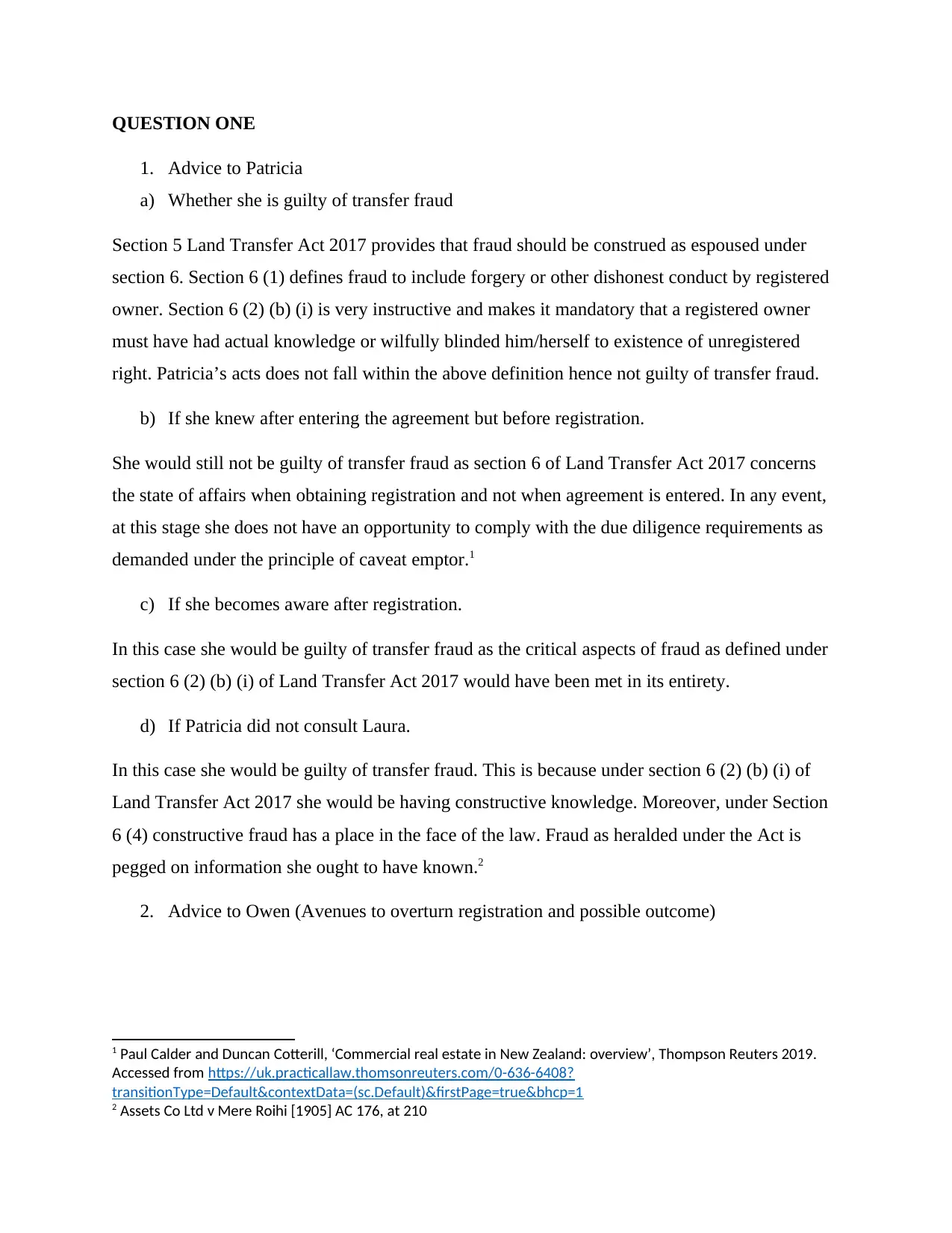
QUESTION ONE
1. Advice to Patricia
a) Whether she is guilty of transfer fraud
Section 5 Land Transfer Act 2017 provides that fraud should be construed as espoused under
section 6. Section 6 (1) defines fraud to include forgery or other dishonest conduct by registered
owner. Section 6 (2) (b) (i) is very instructive and makes it mandatory that a registered owner
must have had actual knowledge or wilfully blinded him/herself to existence of unregistered
right. Patricia’s acts does not fall within the above definition hence not guilty of transfer fraud.
b) If she knew after entering the agreement but before registration.
She would still not be guilty of transfer fraud as section 6 of Land Transfer Act 2017 concerns
the state of affairs when obtaining registration and not when agreement is entered. In any event,
at this stage she does not have an opportunity to comply with the due diligence requirements as
demanded under the principle of caveat emptor.1
c) If she becomes aware after registration.
In this case she would be guilty of transfer fraud as the critical aspects of fraud as defined under
section 6 (2) (b) (i) of Land Transfer Act 2017 would have been met in its entirety.
d) If Patricia did not consult Laura.
In this case she would be guilty of transfer fraud. This is because under section 6 (2) (b) (i) of
Land Transfer Act 2017 she would be having constructive knowledge. Moreover, under Section
6 (4) constructive fraud has a place in the face of the law. Fraud as heralded under the Act is
pegged on information she ought to have known.2
2. Advice to Owen (Avenues to overturn registration and possible outcome)
1 Paul Calder and Duncan Cotterill, ‘Commercial real estate in New Zealand: overview’, Thompson Reuters 2019.
Accessed from https://uk.practicallaw.thomsonreuters.com/0-636-6408?
transitionType=Default&contextData=(sc.Default)&firstPage=true&bhcp=1
2 Assets Co Ltd v Mere Roihi [1905] AC 176, at 210
1. Advice to Patricia
a) Whether she is guilty of transfer fraud
Section 5 Land Transfer Act 2017 provides that fraud should be construed as espoused under
section 6. Section 6 (1) defines fraud to include forgery or other dishonest conduct by registered
owner. Section 6 (2) (b) (i) is very instructive and makes it mandatory that a registered owner
must have had actual knowledge or wilfully blinded him/herself to existence of unregistered
right. Patricia’s acts does not fall within the above definition hence not guilty of transfer fraud.
b) If she knew after entering the agreement but before registration.
She would still not be guilty of transfer fraud as section 6 of Land Transfer Act 2017 concerns
the state of affairs when obtaining registration and not when agreement is entered. In any event,
at this stage she does not have an opportunity to comply with the due diligence requirements as
demanded under the principle of caveat emptor.1
c) If she becomes aware after registration.
In this case she would be guilty of transfer fraud as the critical aspects of fraud as defined under
section 6 (2) (b) (i) of Land Transfer Act 2017 would have been met in its entirety.
d) If Patricia did not consult Laura.
In this case she would be guilty of transfer fraud. This is because under section 6 (2) (b) (i) of
Land Transfer Act 2017 she would be having constructive knowledge. Moreover, under Section
6 (4) constructive fraud has a place in the face of the law. Fraud as heralded under the Act is
pegged on information she ought to have known.2
2. Advice to Owen (Avenues to overturn registration and possible outcome)
1 Paul Calder and Duncan Cotterill, ‘Commercial real estate in New Zealand: overview’, Thompson Reuters 2019.
Accessed from https://uk.practicallaw.thomsonreuters.com/0-636-6408?
transitionType=Default&contextData=(sc.Default)&firstPage=true&bhcp=1
2 Assets Co Ltd v Mere Roihi [1905] AC 176, at 210
Secure Best Marks with AI Grader
Need help grading? Try our AI Grader for instant feedback on your assignments.
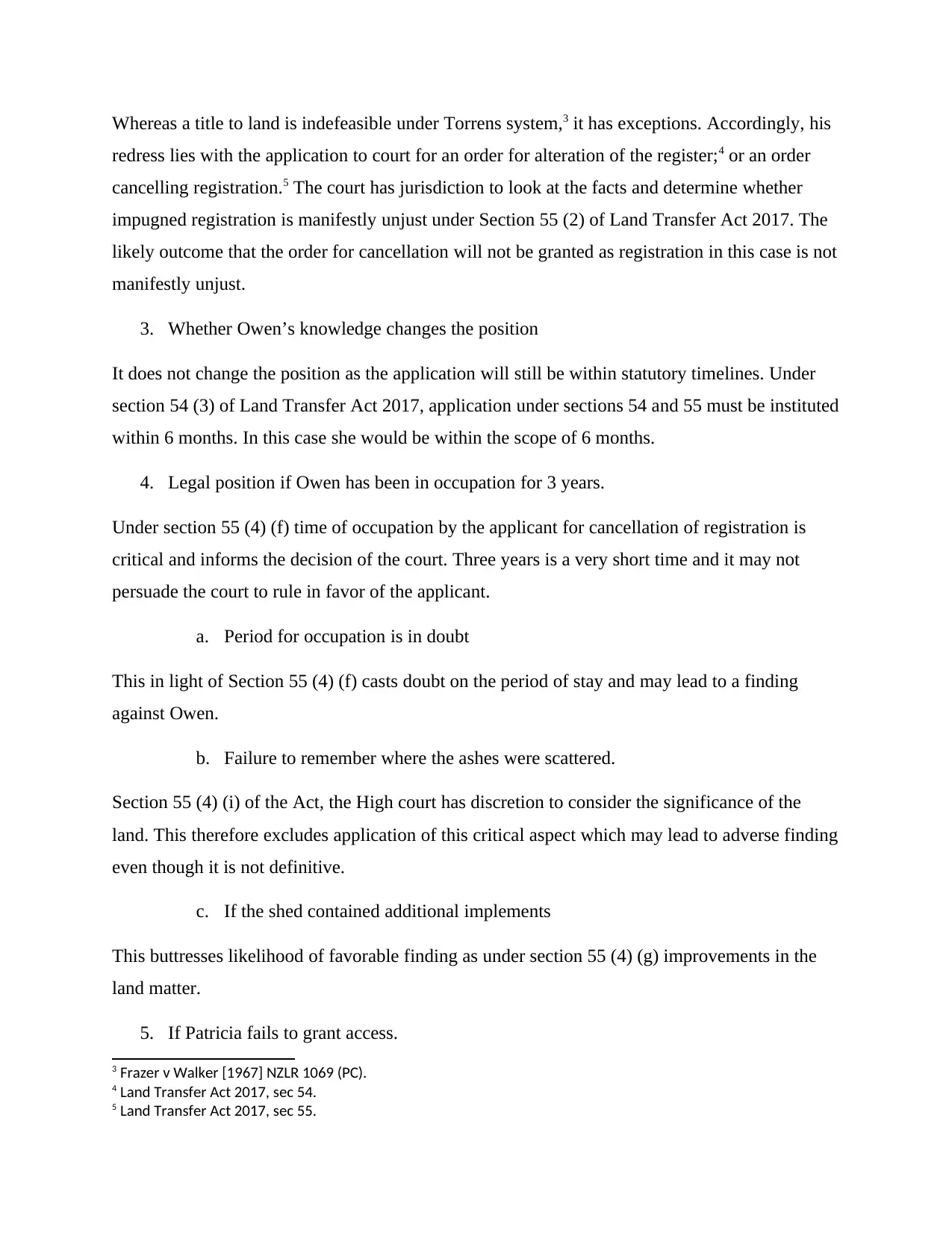
Whereas a title to land is indefeasible under Torrens system,3 it has exceptions. Accordingly, his
redress lies with the application to court for an order for alteration of the register;4 or an order
cancelling registration.5 The court has jurisdiction to look at the facts and determine whether
impugned registration is manifestly unjust under Section 55 (2) of Land Transfer Act 2017. The
likely outcome that the order for cancellation will not be granted as registration in this case is not
manifestly unjust.
3. Whether Owen’s knowledge changes the position
It does not change the position as the application will still be within statutory timelines. Under
section 54 (3) of Land Transfer Act 2017, application under sections 54 and 55 must be instituted
within 6 months. In this case she would be within the scope of 6 months.
4. Legal position if Owen has been in occupation for 3 years.
Under section 55 (4) (f) time of occupation by the applicant for cancellation of registration is
critical and informs the decision of the court. Three years is a very short time and it may not
persuade the court to rule in favor of the applicant.
a. Period for occupation is in doubt
This in light of Section 55 (4) (f) casts doubt on the period of stay and may lead to a finding
against Owen.
b. Failure to remember where the ashes were scattered.
Section 55 (4) (i) of the Act, the High court has discretion to consider the significance of the
land. This therefore excludes application of this critical aspect which may lead to adverse finding
even though it is not definitive.
c. If the shed contained additional implements
This buttresses likelihood of favorable finding as under section 55 (4) (g) improvements in the
land matter.
5. If Patricia fails to grant access.
3 Frazer v Walker [1967] NZLR 1069 (PC).
4 Land Transfer Act 2017, sec 54.
5 Land Transfer Act 2017, sec 55.
redress lies with the application to court for an order for alteration of the register;4 or an order
cancelling registration.5 The court has jurisdiction to look at the facts and determine whether
impugned registration is manifestly unjust under Section 55 (2) of Land Transfer Act 2017. The
likely outcome that the order for cancellation will not be granted as registration in this case is not
manifestly unjust.
3. Whether Owen’s knowledge changes the position
It does not change the position as the application will still be within statutory timelines. Under
section 54 (3) of Land Transfer Act 2017, application under sections 54 and 55 must be instituted
within 6 months. In this case she would be within the scope of 6 months.
4. Legal position if Owen has been in occupation for 3 years.
Under section 55 (4) (f) time of occupation by the applicant for cancellation of registration is
critical and informs the decision of the court. Three years is a very short time and it may not
persuade the court to rule in favor of the applicant.
a. Period for occupation is in doubt
This in light of Section 55 (4) (f) casts doubt on the period of stay and may lead to a finding
against Owen.
b. Failure to remember where the ashes were scattered.
Section 55 (4) (i) of the Act, the High court has discretion to consider the significance of the
land. This therefore excludes application of this critical aspect which may lead to adverse finding
even though it is not definitive.
c. If the shed contained additional implements
This buttresses likelihood of favorable finding as under section 55 (4) (g) improvements in the
land matter.
5. If Patricia fails to grant access.
3 Frazer v Walker [1967] NZLR 1069 (PC).
4 Land Transfer Act 2017, sec 54.
5 Land Transfer Act 2017, sec 55.

Right to access or way is guaranteed under subpart 4 of the Act in form of easements. Patricia
only needs to apply to the registrar under section 108 via easement instruments for easement.
This will grant him right of access.
only needs to apply to the registrar under section 108 via easement instruments for easement.
This will grant him right of access.
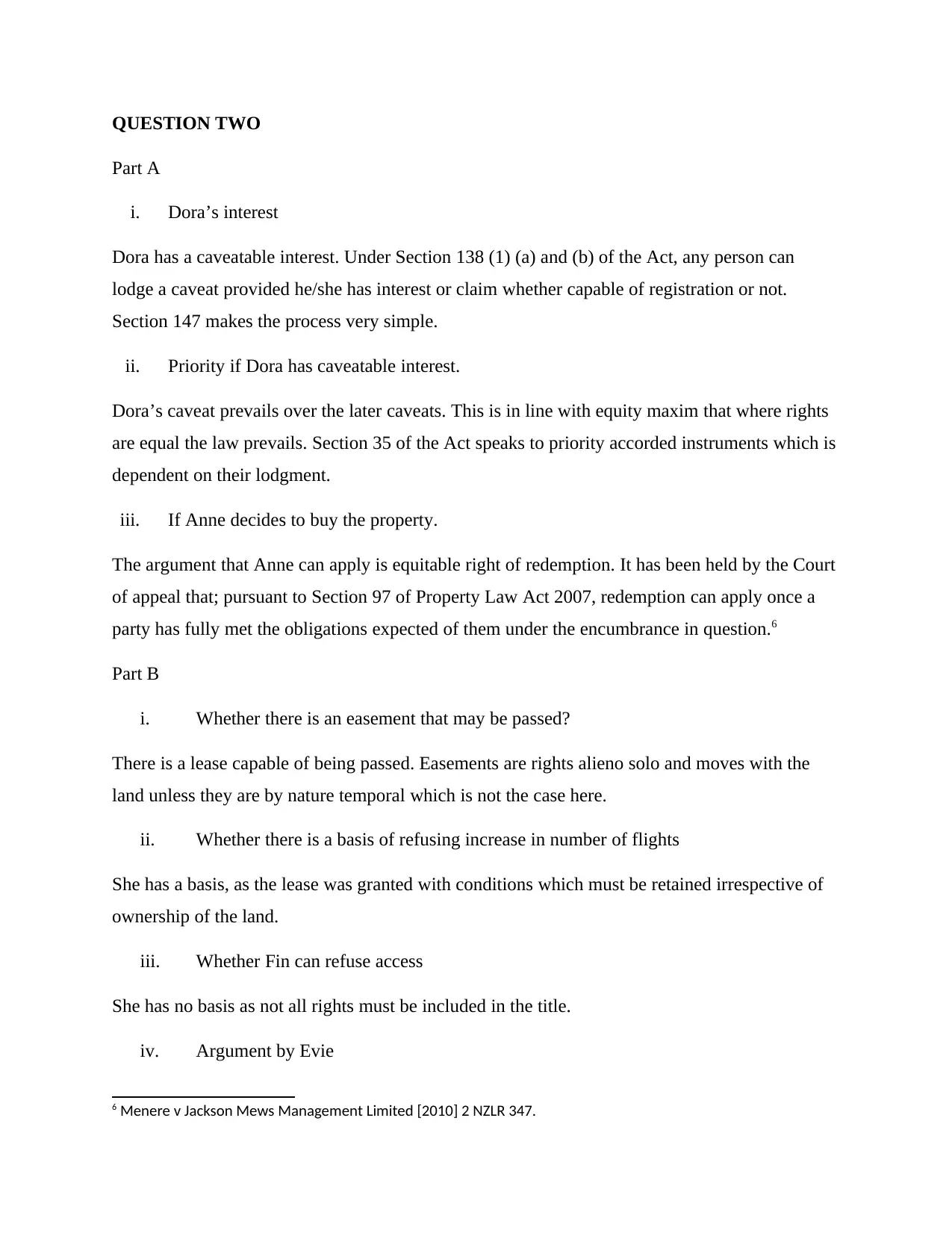
QUESTION TWO
Part A
i. Dora’s interest
Dora has a caveatable interest. Under Section 138 (1) (a) and (b) of the Act, any person can
lodge a caveat provided he/she has interest or claim whether capable of registration or not.
Section 147 makes the process very simple.
ii. Priority if Dora has caveatable interest.
Dora’s caveat prevails over the later caveats. This is in line with equity maxim that where rights
are equal the law prevails. Section 35 of the Act speaks to priority accorded instruments which is
dependent on their lodgment.
iii. If Anne decides to buy the property.
The argument that Anne can apply is equitable right of redemption. It has been held by the Court
of appeal that; pursuant to Section 97 of Property Law Act 2007, redemption can apply once a
party has fully met the obligations expected of them under the encumbrance in question.6
Part B
i. Whether there is an easement that may be passed?
There is a lease capable of being passed. Easements are rights alieno solo and moves with the
land unless they are by nature temporal which is not the case here.
ii. Whether there is a basis of refusing increase in number of flights
She has a basis, as the lease was granted with conditions which must be retained irrespective of
ownership of the land.
iii. Whether Fin can refuse access
She has no basis as not all rights must be included in the title.
iv. Argument by Evie
6 Menere v Jackson Mews Management Limited [2010] 2 NZLR 347.
Part A
i. Dora’s interest
Dora has a caveatable interest. Under Section 138 (1) (a) and (b) of the Act, any person can
lodge a caveat provided he/she has interest or claim whether capable of registration or not.
Section 147 makes the process very simple.
ii. Priority if Dora has caveatable interest.
Dora’s caveat prevails over the later caveats. This is in line with equity maxim that where rights
are equal the law prevails. Section 35 of the Act speaks to priority accorded instruments which is
dependent on their lodgment.
iii. If Anne decides to buy the property.
The argument that Anne can apply is equitable right of redemption. It has been held by the Court
of appeal that; pursuant to Section 97 of Property Law Act 2007, redemption can apply once a
party has fully met the obligations expected of them under the encumbrance in question.6
Part B
i. Whether there is an easement that may be passed?
There is a lease capable of being passed. Easements are rights alieno solo and moves with the
land unless they are by nature temporal which is not the case here.
ii. Whether there is a basis of refusing increase in number of flights
She has a basis, as the lease was granted with conditions which must be retained irrespective of
ownership of the land.
iii. Whether Fin can refuse access
She has no basis as not all rights must be included in the title.
iv. Argument by Evie
6 Menere v Jackson Mews Management Limited [2010] 2 NZLR 347.
Secure Best Marks with AI Grader
Need help grading? Try our AI Grader for instant feedback on your assignments.

She needs to argue that access is necessary for enjoyment of her land. She has low chances of
success as her rights must be balanced against those of Fin.
QUESTION THREE
success as her rights must be balanced against those of Fin.
QUESTION THREE
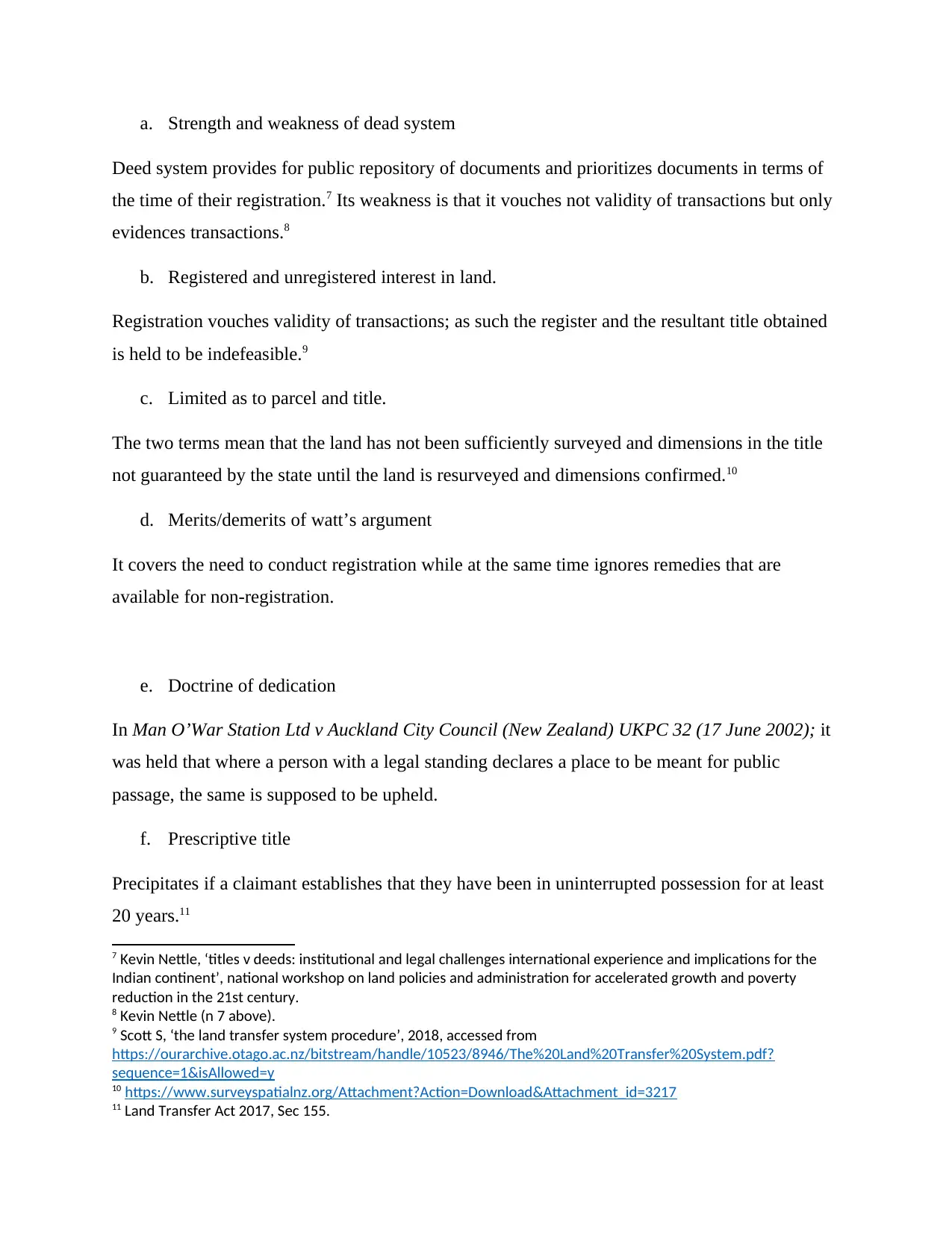
a. Strength and weakness of dead system
Deed system provides for public repository of documents and prioritizes documents in terms of
the time of their registration.7 Its weakness is that it vouches not validity of transactions but only
evidences transactions.8
b. Registered and unregistered interest in land.
Registration vouches validity of transactions; as such the register and the resultant title obtained
is held to be indefeasible.9
c. Limited as to parcel and title.
The two terms mean that the land has not been sufficiently surveyed and dimensions in the title
not guaranteed by the state until the land is resurveyed and dimensions confirmed.10
d. Merits/demerits of watt’s argument
It covers the need to conduct registration while at the same time ignores remedies that are
available for non-registration.
e. Doctrine of dedication
In Man O’War Station Ltd v Auckland City Council (New Zealand) UKPC 32 (17 June 2002); it
was held that where a person with a legal standing declares a place to be meant for public
passage, the same is supposed to be upheld.
f. Prescriptive title
Precipitates if a claimant establishes that they have been in uninterrupted possession for at least
20 years.11
7 Kevin Nettle, ‘titles v deeds: institutional and legal challenges international experience and implications for the
Indian continent’, national workshop on land policies and administration for accelerated growth and poverty
reduction in the 21st century.
8 Kevin Nettle (n 7 above).
9 Scott S, ‘the land transfer system procedure’, 2018, accessed from
https://ourarchive.otago.ac.nz/bitstream/handle/10523/8946/The%20Land%20Transfer%20System.pdf?
sequence=1&isAllowed=y
10 https://www.surveyspatialnz.org/Attachment?Action=Download&Attachment_id=3217
11 Land Transfer Act 2017, Sec 155.
Deed system provides for public repository of documents and prioritizes documents in terms of
the time of their registration.7 Its weakness is that it vouches not validity of transactions but only
evidences transactions.8
b. Registered and unregistered interest in land.
Registration vouches validity of transactions; as such the register and the resultant title obtained
is held to be indefeasible.9
c. Limited as to parcel and title.
The two terms mean that the land has not been sufficiently surveyed and dimensions in the title
not guaranteed by the state until the land is resurveyed and dimensions confirmed.10
d. Merits/demerits of watt’s argument
It covers the need to conduct registration while at the same time ignores remedies that are
available for non-registration.
e. Doctrine of dedication
In Man O’War Station Ltd v Auckland City Council (New Zealand) UKPC 32 (17 June 2002); it
was held that where a person with a legal standing declares a place to be meant for public
passage, the same is supposed to be upheld.
f. Prescriptive title
Precipitates if a claimant establishes that they have been in uninterrupted possession for at least
20 years.11
7 Kevin Nettle, ‘titles v deeds: institutional and legal challenges international experience and implications for the
Indian continent’, national workshop on land policies and administration for accelerated growth and poverty
reduction in the 21st century.
8 Kevin Nettle (n 7 above).
9 Scott S, ‘the land transfer system procedure’, 2018, accessed from
https://ourarchive.otago.ac.nz/bitstream/handle/10523/8946/The%20Land%20Transfer%20System.pdf?
sequence=1&isAllowed=y
10 https://www.surveyspatialnz.org/Attachment?Action=Download&Attachment_id=3217
11 Land Transfer Act 2017, Sec 155.

QUESTION FOUR
a. Principle in Tulk v Moxhay
a. Principle in Tulk v Moxhay
Paraphrase This Document
Need a fresh take? Get an instant paraphrase of this document with our AI Paraphraser
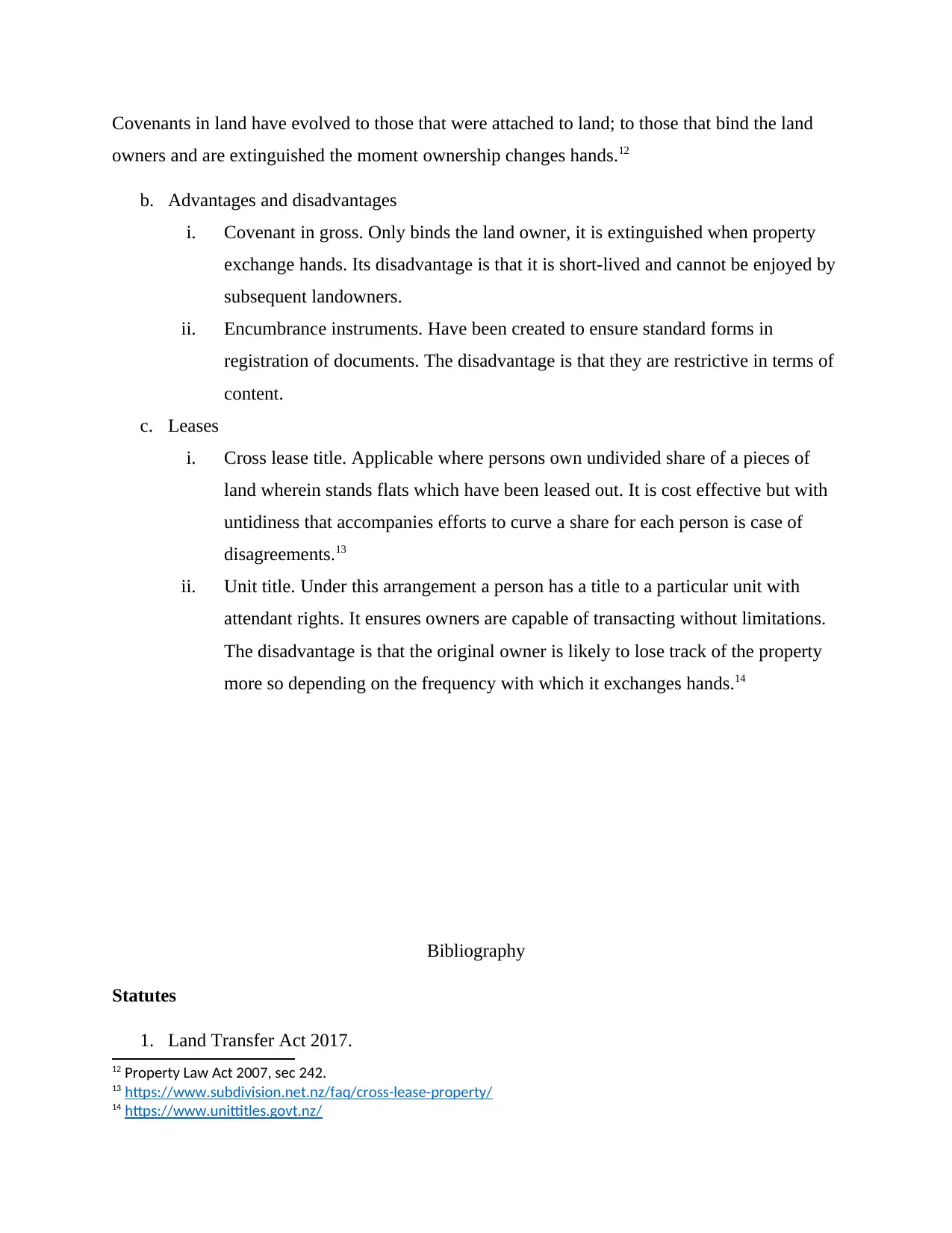
Covenants in land have evolved to those that were attached to land; to those that bind the land
owners and are extinguished the moment ownership changes hands.12
b. Advantages and disadvantages
i. Covenant in gross. Only binds the land owner, it is extinguished when property
exchange hands. Its disadvantage is that it is short-lived and cannot be enjoyed by
subsequent landowners.
ii. Encumbrance instruments. Have been created to ensure standard forms in
registration of documents. The disadvantage is that they are restrictive in terms of
content.
c. Leases
i. Cross lease title. Applicable where persons own undivided share of a pieces of
land wherein stands flats which have been leased out. It is cost effective but with
untidiness that accompanies efforts to curve a share for each person is case of
disagreements.13
ii. Unit title. Under this arrangement a person has a title to a particular unit with
attendant rights. It ensures owners are capable of transacting without limitations.
The disadvantage is that the original owner is likely to lose track of the property
more so depending on the frequency with which it exchanges hands.14
Bibliography
Statutes
1. Land Transfer Act 2017.
12 Property Law Act 2007, sec 242.
13 https://www.subdivision.net.nz/faq/cross-lease-property/
14 https://www.unittitles.govt.nz/
owners and are extinguished the moment ownership changes hands.12
b. Advantages and disadvantages
i. Covenant in gross. Only binds the land owner, it is extinguished when property
exchange hands. Its disadvantage is that it is short-lived and cannot be enjoyed by
subsequent landowners.
ii. Encumbrance instruments. Have been created to ensure standard forms in
registration of documents. The disadvantage is that they are restrictive in terms of
content.
c. Leases
i. Cross lease title. Applicable where persons own undivided share of a pieces of
land wherein stands flats which have been leased out. It is cost effective but with
untidiness that accompanies efforts to curve a share for each person is case of
disagreements.13
ii. Unit title. Under this arrangement a person has a title to a particular unit with
attendant rights. It ensures owners are capable of transacting without limitations.
The disadvantage is that the original owner is likely to lose track of the property
more so depending on the frequency with which it exchanges hands.14
Bibliography
Statutes
1. Land Transfer Act 2017.
12 Property Law Act 2007, sec 242.
13 https://www.subdivision.net.nz/faq/cross-lease-property/
14 https://www.unittitles.govt.nz/
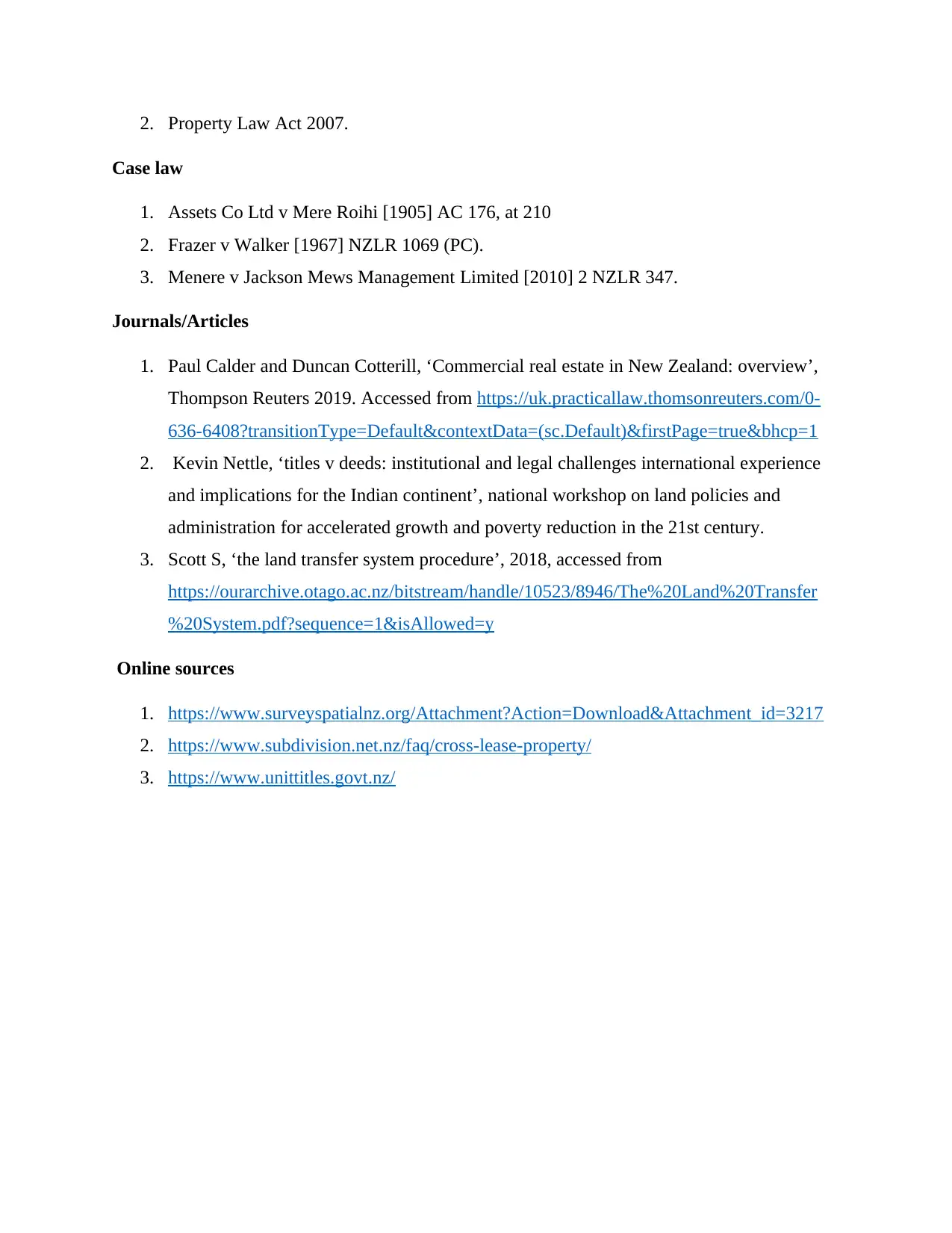
2. Property Law Act 2007.
Case law
1. Assets Co Ltd v Mere Roihi [1905] AC 176, at 210
2. Frazer v Walker [1967] NZLR 1069 (PC).
3. Menere v Jackson Mews Management Limited [2010] 2 NZLR 347.
Journals/Articles
1. Paul Calder and Duncan Cotterill, ‘Commercial real estate in New Zealand: overview’,
Thompson Reuters 2019. Accessed from https://uk.practicallaw.thomsonreuters.com/0-
636-6408?transitionType=Default&contextData=(sc.Default)&firstPage=true&bhcp=1
2. Kevin Nettle, ‘titles v deeds: institutional and legal challenges international experience
and implications for the Indian continent’, national workshop on land policies and
administration for accelerated growth and poverty reduction in the 21st century.
3. Scott S, ‘the land transfer system procedure’, 2018, accessed from
https://ourarchive.otago.ac.nz/bitstream/handle/10523/8946/The%20Land%20Transfer
%20System.pdf?sequence=1&isAllowed=y
Online sources
1. https://www.surveyspatialnz.org/Attachment?Action=Download&Attachment_id=3217
2. https://www.subdivision.net.nz/faq/cross-lease-property/
3. https://www.unittitles.govt.nz/
Case law
1. Assets Co Ltd v Mere Roihi [1905] AC 176, at 210
2. Frazer v Walker [1967] NZLR 1069 (PC).
3. Menere v Jackson Mews Management Limited [2010] 2 NZLR 347.
Journals/Articles
1. Paul Calder and Duncan Cotterill, ‘Commercial real estate in New Zealand: overview’,
Thompson Reuters 2019. Accessed from https://uk.practicallaw.thomsonreuters.com/0-
636-6408?transitionType=Default&contextData=(sc.Default)&firstPage=true&bhcp=1
2. Kevin Nettle, ‘titles v deeds: institutional and legal challenges international experience
and implications for the Indian continent’, national workshop on land policies and
administration for accelerated growth and poverty reduction in the 21st century.
3. Scott S, ‘the land transfer system procedure’, 2018, accessed from
https://ourarchive.otago.ac.nz/bitstream/handle/10523/8946/The%20Land%20Transfer
%20System.pdf?sequence=1&isAllowed=y
Online sources
1. https://www.surveyspatialnz.org/Attachment?Action=Download&Attachment_id=3217
2. https://www.subdivision.net.nz/faq/cross-lease-property/
3. https://www.unittitles.govt.nz/
1 out of 9
Your All-in-One AI-Powered Toolkit for Academic Success.
+13062052269
info@desklib.com
Available 24*7 on WhatsApp / Email
![[object Object]](/_next/static/media/star-bottom.7253800d.svg)
Unlock your academic potential
© 2024 | Zucol Services PVT LTD | All rights reserved.




